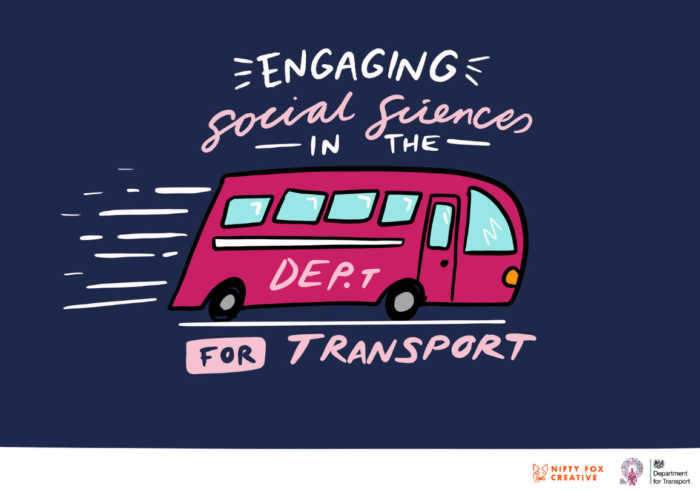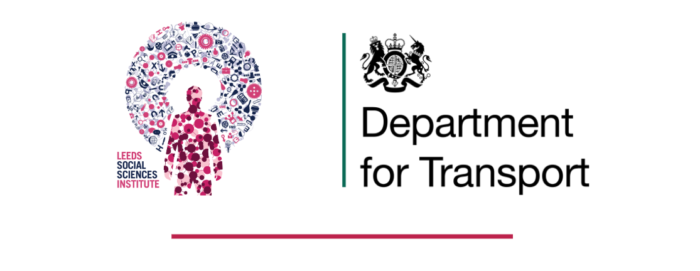Engaging the Social Sciences: LSSI & the Department for Transport
On Tuesday 3 March, LSSI brought together researchers from the University of Leeds with policy makers, analysts, and strategists from the Department for Transport (DfT) for a one-day collaborative event in central London.
15 University of Leeds Researchers and 20 colleagues from DfT came together to present research, discuss effective methods of and barriers to collaboration and engagement, and spent time in groups exploring mechanisms of increasing collaboration to support research-led policy making.

The day began with an introduction from Professor Karen Lucas (Institute for Transport Studies & Leeds Social Sciences Institute), followed by a keynote address from Jo Bacon, Head of Social and Behavioural Research at DfT. The day's presentations and discussions were summarised visually by Laura from Nifty Fox Creative.


Jo's presentation centered on the department's current key priorities and areas where there are evidence gaps: De-carbonisation; 'levelling up'; and 'ageing society and safety' were the primary areas under investigation. Timely, cutting-edge research is required to help identify the long-term strategic evidence gaps and needs, and to help DfT to direct investment in line with its priority areas.
Jo also spoke about a number of mechanisms that can be jointly utilised by researchers and DfT colleagues to aid collaboration, such as: secondments and placements; secondary data analysis; project support and dissemination of findings; training and development opportunities; and the DfT's 'Bridge to Research', which provides rapid two-way communication between the department and academia and should be used as a first port of call when exploring potential research relationships.
University of Leeds Researcher Presentations
Following the initial presentations, a number of researchers from the University of Leeds (ranging from Doctoral Researchers to those more advanced in their careers), gave rapid, 5-minute summaries of their transport focused research projects, specifically highlighting any project findings relevant to DfTs priority areas.
Dr Chiara Calastri gave the first presentation, summarising her research on 'Demonstrating the benefits of a gendered approach to quantitative analysis of transport data':

Postgraduate Researcher (Institute for Transport Studies), Ioanna Moscholidou, gave a presentation on her research on 'The Governance of Smart Mobility Systems':


Next, Dr Jo-Ann Pattinson (Institute for Transport Studies) presented on 'Consent Herding in Automation':

Postgraduate Researcher (Institute for Transport Studies), Lamprini Papafoti, presented her research which explores the question 'How will autonomous vehicles impact on older people's accessibility levels?'
Lamprini has recently undertaken an LSSI 'PGR Placement', which has allowed her to undertake work in the 'Centre for Ageing Better', working with Leeds City Council and the West Yorkshire Combined Authority. The project aims to improve the transport access of older people, through the development of a door-to-door transport hub. Lamprini commented that the placement, 'set me up very well to conduct more of my own research'. More information about our PGR Placement opportunities can be found here.

Following Lamprini's presentation, postgraduate Researcher (Institute for Transport Studies), Jeroen Bastiaanssen, presented methodology and findings from his research exploring 'Public transport job accessibility and young people':

Postgraduate Researcher (Institute for Transport Studies), Ian Greenwood, then shared details of his research which is around 'The politics of road deaths (UK road safety)':

This session was then brought to a close by Dr Ian Philips, Research Fellow (Institute for Transport Studies), who shared his research on 'E-bikes reducing social vulnerability and decarbonising transport':


Facilitated Breakout Discussions
After the research presentations came a chance for colleagues from DfT to link up with University of Leeds researchers to explore different areas of collaborative development. The three breakout groups were themed around (i) 'Social Impact Appraisal', (ii) 'Social Policy and Project Evaluation' and (iii) 'Social Policy Development'.
Social Impact Appraisal
The discussion from this group (a mix of strategists and analysts from DfT and researchers from the University of Leeds) first explored some of the pressing current challenges, such as:
- The difficulty of monetising social impact. It can be challenging to prove tangible return on investment for developments with a social impact focus. This can make commissioning and evaluating investment of this kind challenging. For example, analysing economic ROI of projects that improve accessibility can be challenging as the composite costs of developing transport links and improving accessibility should be offset by resulting increases in employment rate etc. However, this can be difficult to quantify.
- The idea of a 'people-centered' focus can raise challenges around the way that data is collected and modeled and often frequently presents validity issues as it can be necessary to assume that people are the same or very similar for evaluation purposes.
The group also considered areas of changing focus:
- Moving more towards 'people-centered analysis' to focus on who benefits from investments in transport infrastructure.
- An awareness that appraisal methods need to consider the different kinds of interventions required for different groups of people.

Social Policy and Project Evaluation
This group started by exploring the idea of project evaluation and the role of social research and looked at the associated challenges, such as:
- It can be difficult for researchers early in their career to build a relationship with a department as they may be unsure who to contact to initiate collaboration.
- Project evaluation can be a challenge if projects are separated by time and carried out or completed in the term of more than one government.
- Specific policy wording may change over time and with different governments (even if the meaning remains essentially unchanged), this can make it difficult for researchers to know which research areas certain policies link in to.
The group then went on to identify some possible opportunities for collaboration:
- Academics at the University of Leeds can increase involvement with DfT by: conducting peer-reviews at local investments to support mode shift; support quality assurance of DfT work by offering specialist advice; use the 'Bridge to Research' function to facilitate smarter coordination of applicable research and policy.
- DfT may be able to provide funding for local authorities to work with academics on particularly projects which sit within areas where they require evaluation/appraisal.
- More research around behaviour modelling is required.

Social Policy Development
Finally, the group discussing Social Policy Development came together to discuss some of DfT's most prominent priority areas (in relation to research): the 'levelling up' agenda; housing and land-use planning; future mobility; freight; mode shift (particularly around decarbonisation); road safety; ageing society.
The group spent time thinking about current methods of information dissemination, and identifying methods of streamlining approaches:
- DfT has many useful data sets that can be utilised by academic researchers.
- Awareness raising work needs to be done around the 'Bridge to Research' mechanism to ensure it is used to its full potential for two-way communication. For example, the 'Bridge to Research' can be used to assist with finding a collaborator for projects of any scale.
- Researchers need to be aware of policy objectives (this is perhaps particularly relevant for Doctoral Researchers who may only have scope to link-up over the 3-4 years of their doctoral research).
- Discussion about possible methods of sharing key, relevant research developments from the University with the DfT on a regular basis (e.g. regular updates).

Key Themes & Future Considerations
The day closed with a round-up of key themes of discussion and summarising of next steps:

Many thanks to everyone who took part in the day and contributed to the collaborative, solution-focused atmosphere. Further mechanisms and activities will be implemented, both at the University and DfT as a result of the day's conversations. If you would like to know more, please contact LSSI Engagement Officer, Camilla McCartney.
LSSI Funding Opportunities to Support Engagement
LSSI's ESRC Impact Acceleration Account (IAA) can be utilised to collaborate with external organisations, including government departments such as DfT.
The below funding schemes are accessible to University of Leeds colleagues in partnership with DfT as an external collaborator:
- Responsive Mode Impact Fund (flexible funding for cross-disciplinary projects. The fund can be used to support relationship building activities with non-academic partners)
- Knowledge Exchange Fellowships (for both incoming and outward fellowships)
- Rapid Action Fund (allows researchers to react quickly to influence governmental, national, or international debate)
LSSI also runs a 'PGR Placements' scheme which supports Postgraduate Researchers to work on specific research projects to benefit both the PGR and an external partner (such as a policy organisation).

